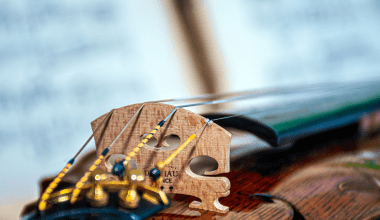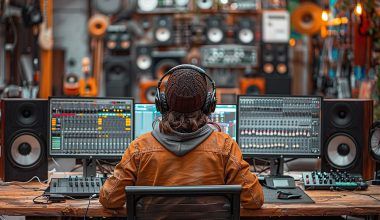Understanding the Music Publisher Definition
Have you ever wondered who makes sure musicians get paid when their songs are played on the radio or used in a movie? That’s the job of a music publisher! In simple words, a music publisher helps songwriters and composers earn money from their music. They handle all the complicated stuff like copyrights, royalties, and licensing deals, so the artist can focus on making great music.
This blog will explain the music publisher definition step by step. By the end, you’ll understand why publishers are so important, what they do, and how they can help you grow your music career. Let’s dive in!
What Does a Music Publisher Do?
A music publisher has many responsibilities. Let’s break them down into simple points:
1. Protecting Your Music
When you write a song, it’s important to protect it so no one else can claim it as their own. This is called copyrighting. A music publisher registers your songs with copyright offices to ensure they legally belong to you.
2. Collecting Money (Royalties)
Every time someone plays your music—on the radio, in a café, or on Spotify—you earn money called royalties. But tracking this money is tricky. Music publishers do the hard work of finding out where your music is used and collecting royalties for you.
3. Getting Your Music into Movies and Ads
Music publishers also find ways to use your songs in movies, advertisements, TV shows, or video games. This is called licensing, and it can help you earn a lot more money.
4. Promoting Your Music
Sometimes, the hardest part for musicians is getting their music noticed. Publishers pitch your songs to people in the industry, like movie directors, record labels, or streaming platforms, so more people can hear your music.
Why is a Music Publisher Important?
A music publisher does much more than just manage copyrights. Here’s why they are crucial for songwriters and musicians:
1. They Save You Time
Managing copyrights, royalties, and licensing is time-consuming. A publisher takes care of this so you can focus on creating music.
2. They Increase Your Earnings
Music publishers know where to find new opportunities for your songs. They make sure you earn money from all possible sources.
3. They Have Industry Connections
A publisher has connections with film producers, ad agencies, and big companies. They can help your music reach these industries.
4. They Protect Your Rights
If someone uses your music without permission, your publisher will make sure you get paid or take legal action if needed.
Key Terms to Know About Music Publishing
Before we go further, let’s learn some simple terms related to the music publisher definition:
- Copyright: The legal right to own and control your music.
- Royalties: Money earned when your music is used commercially.
- Licensing: Giving permission for others to use your music, like in movies or ads.
- Sync Deal: When your music is used in a movie, TV show, or advertisement.
- Performance Rights Organization (PRO): Groups like ASCAP or BMI that collect royalties for artists.
Types of Music Publishers
Not all music publishers are the same. Here are the different types of publishers and what they do:
1. Traditional Music Publishers
These publishers take care of everything—copyright, royalties, licensing, and promotion. They usually keep 50% of the earnings and give the rest to the songwriter.
2. Independent Publishers
Smaller companies that often work closely with artists. They provide more personalized services and are popular among independent musicians.
3. Online Publishing Platforms
Today, many websites and tools, like Deliver My Tune, offer music publishing services. These platforms make it easier for artists to manage their music online.
Types of Music Publishing Deals
When you work with a music publisher, you sign a deal. Here are the most common types of deals:
1. Full Publishing Deal
The publisher takes ownership of your songs and handles everything. You get 50% of the royalties.
2. Co-Publishing Deal
You share ownership with the publisher. This means you earn more—usually 75% of the royalties.
3. Administration Deal
In this deal, you keep 100% ownership of your music, and the publisher only helps with collecting royalties or managing licenses. They charge a small fee for this.
4. Single-Song Agreement
This is a deal for just one song instead of your whole catalog. It’s a good option for new artists.
Steps to Find the Right Music Publisher
Finding the right publisher is important. Here’s how you can do it:
- Research Publishers Look for publishers who work in your music genre and have a good reputation.
- Check Their Services Some publishers focus only on royalties, while others also help with licensing and promotion. Choose one that fits your needs.
- Read the Contract Always read the contract carefully. Make sure you understand how royalties will be split and whether you keep ownership of your music.
- Ask for Recommendations Talk to other artists and ask them about their experiences with publishers.
Can You Be Your Own Music Publisher?
Yes, you can! Many artists today choose to be their own publisher. Platforms like Deliver My Tune help artists manage their music, royalties, and licensing without a traditional publisher. Being your own publisher gives you more control, but it also means more work.
Music Publishing and Technology
The role of a music publisher has changed a lot thanks to technology. Here’s how:
- AI Tools: AI mastering tools help improve the sound quality of your music before it’s distributed.
- Royalty Tracking Apps: These apps make it easier to track where your music is being played and how much money you are earning.
- Online Platforms: Websites like Deliver My Tune simplify music publishing and make it accessible to everyone.
Frequently Asked Questions About Music Publishing
1. What is a music publisher in simple words?
A music publisher helps songwriters and composers earn money from their music by managing copyrights, collecting royalties, and finding licensing opportunities.
2. Do I need a music publisher?
If you’re serious about earning money from your music, a publisher can be very helpful. However, if you’re just starting out, you might not need one right away.
3. How much do music publishers charge?
Most publishers take a percentage of your earnings. For example, in a full publishing deal, they might take 50%.
4. Can I publish my own music?
Yes! With tools like Deliver My Tune, you can manage your own music publishing.
Final Thoughts: Why Understanding Music Publishing is Important
The music publisher definition might seem simple, but their work is essential for every artist. They make sure your hard work is protected, promoted, and paid for. Whether you choose to work with a traditional publisher or use a platform like Deliver My Tune, understanding how music publishing works is the first step to growing your career.
If you’re ready to take control of your music, start learning about publishers or explore online platforms that can help you. Remember, the more you know, the better prepared you’ll be to succeed in the music industry.
Related Articles:
For further reading, explore these related articles:
- How to Become a Successful Music Artist in India in 2024?
- Promo Cards on Spotify: A Game Changer for Artists
- Understanding ISRC Codes and Their Importance in Tracking and Distributing Your Music
For additional resources on music marketing and distribution, visit Deliver My Tune.






